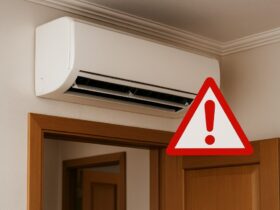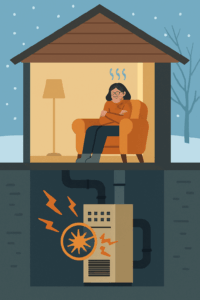It’s tempting to ignore that slight rattle in the furnace or a minor delay in the system kicking on, especially when heat is still coming through the vents. Many homeowners brush these signs off, assuming they can deal with them later—perhaps when winter ends, or the budget feels more comfortable. But what often begins as a manageable repair can become a serious and expensive issue if it’s not addressed promptly. We will explore the cost of delaying heating system repairs beyond just the dollar amount on an invoice. Putting off necessary fixes can have a ripple effect on your utility bills, your health, your home’s value, and your peace of mind. Heating systems are not built to self-correct. When something goes wrong and is left unattended, the damage tends to escalate behind the scenes, leading to costlier repairs and sometimes complete system failures when you need heat the most.
When Small Heating Issues Become Big Problems
- Higher Utility Bills from Struggling Systems
One of the most immediate impacts of a heating system needing repair is the rise in energy bills. When internal components aren’t functioning correctly—such as clogged filters, malfunctioning thermostats, or broken sensors—the system has to work harder to maintain the same level of warmth. This inefficiency shows up directly on your monthly utility statement. A failing component may cause your system to cycle more frequently, stay on longer than necessary, or deliver uneven heat, resulting in wasted energy. Over time, even minor issues like dust buildup or aging fans contribute to the system’s decline in performance. Homeowners who delay calling a technician might not realize that the $50–$100 savings from skipping a service call are quickly overshadowed by increased energy usage over several months. The longer these inefficiencies go uncorrected, the more stress is placed on other parts of the heating system, eventually leading to breakdowns that are far more expensive to resolve than the original repair.
- Shortened Lifespan and Emergency Replacements
Every mechanical system has a lifespan, but that duration depends on how well the system is maintained. Small issues such as a faulty igniter or a worn blower motor may not immediately disable the furnace, but they create extra strain on the remaining components. When the system compensates for a weak part, the cumulative stress leads to premature wear and tear. Delaying a repair means shortening the unit’s life with every cycle under suboptimal conditions. Eventually, the system could fail, often at the worst time—like during the first deep freeze of the season. Emergency replacements are not only costly, they’re also stressful and can leave your family without heat for an extended period. What could have been a manageable fix turned into a full system replacement, complete with labor, parts, and disposal costs. With heating systems often representing one of the most significant investments in a home’s infrastructure, it’s a risk few homeowners can genuinely afford.
- Damage to Your Home from Inconsistent Heating
A heating system in disrepair doesn’t just impact your comfort and budget—it can also cause damage to your home. Inconsistent heating can lead to issues with indoor humidity, affecting materials like hardwood flooring, trim, and even drywall. Homes exposed to fluctuating temperatures during the winter are at risk for condensation buildup, which can encourage mold growth and degrade insulation. Pipes located in colder areas like basements or exterior walls are especially vulnerable if the heating system fails during a cold snap. Frozen or burst pipes result in water damage that can be catastrophic, often leading to expensive repairs that extend well beyond plumbing. Maintaining a reliable heat source isn’t just about staying warm—it’s about protecting the integrity of your home’s infrastructure. Inconsistent heating can also make it difficult for thermostats to regulate temperature properly, creating hot and cold spots that, over time, affect the health of your walls, ceilings, and floors.
- Health and Safety Risks Multiply Over Time
Neglecting heating repairs doesn’t just affect your utility bill or your property—it can also jeopardize your health and safety. Furnaces that burn fuel, such as natural gas or oil, must vent carbon monoxide safely out of the home. If components like heat exchangers or flues become damaged or blocked, this odorless and colorless gas can leak into living areas, creating a potentially fatal hazard. Early repairs and routine maintenance are essential in preventing such risks. Even electric heating systems can pose threats when internal wiring becomes frayed or overheated due to constant operation under strain. Poor indoor air quality from dirty filters or malfunctioning fans can aggravate respiratory conditions like asthma or allergies. Families with children, elderly residents, or those with compromised immune systems are especially vulnerable. That’s why scheduling routine assessments and addressing even minor concerns is key to home safety. Trusting a professional is crucial—professional heating services in Portland can diagnose problems early and help avoid serious health hazards. The cost of prevention is always lower than the cost of responding to a preventable emergency.
- Emotional and Financial Strain of Untimely Breakdowns
There’s no convenient time for your heating system to stop working, but mid-winter failures often come with the highest cost—not just in dollars but in disruption. The stress of scrambling to find an available technician, dealing with emergency service rates, and figuring out alternative heating solutions can take a toll on any household. For those working from home or caring for children or elderly family members, the loss of consistent heat creates additional pressure. Repair appointments may mean time off work or shuffling schedules, while the discomfort of a cold home adds tension to daily routines. Financially, emergency service calls and last-minute replacements often carry a premium cost, especially when HVAC companies are booked solid during peak demand. What could have been a manageable, scheduled repair turns into a race against the cold. Planning by addressing concerns when they first arise protects not just the physical structure of your home but the emotional stability of the people inside it.
Heating systems are often out of sight and out of mind—until they break. But the financial, physical, and emotional toll can be considerable by then. Delaying necessary repairs may seem like a minor decision at the moment. Still, it opens the door to higher energy bills, shortened system lifespan, potential home damage, and serious health risks. Proactive maintenance and timely attention to minor problems are the keys to extending your system’s life and ensuring it performs reliably when needed. Heating issues don’t resolve themselves—they worsen with time, especially under the demands of a long winter. Addressing problems early prevents emergencies and provides peace of mind, knowing your home is warm, safe, and efficient. So, if your heating system makes strange sounds, fails to warm evenly, or shows signs of wear, don’t wait for a breakdown. The cost of waiting is almost always higher than acting now.





